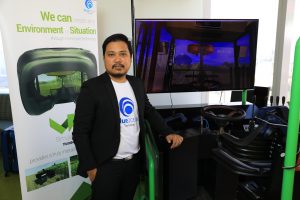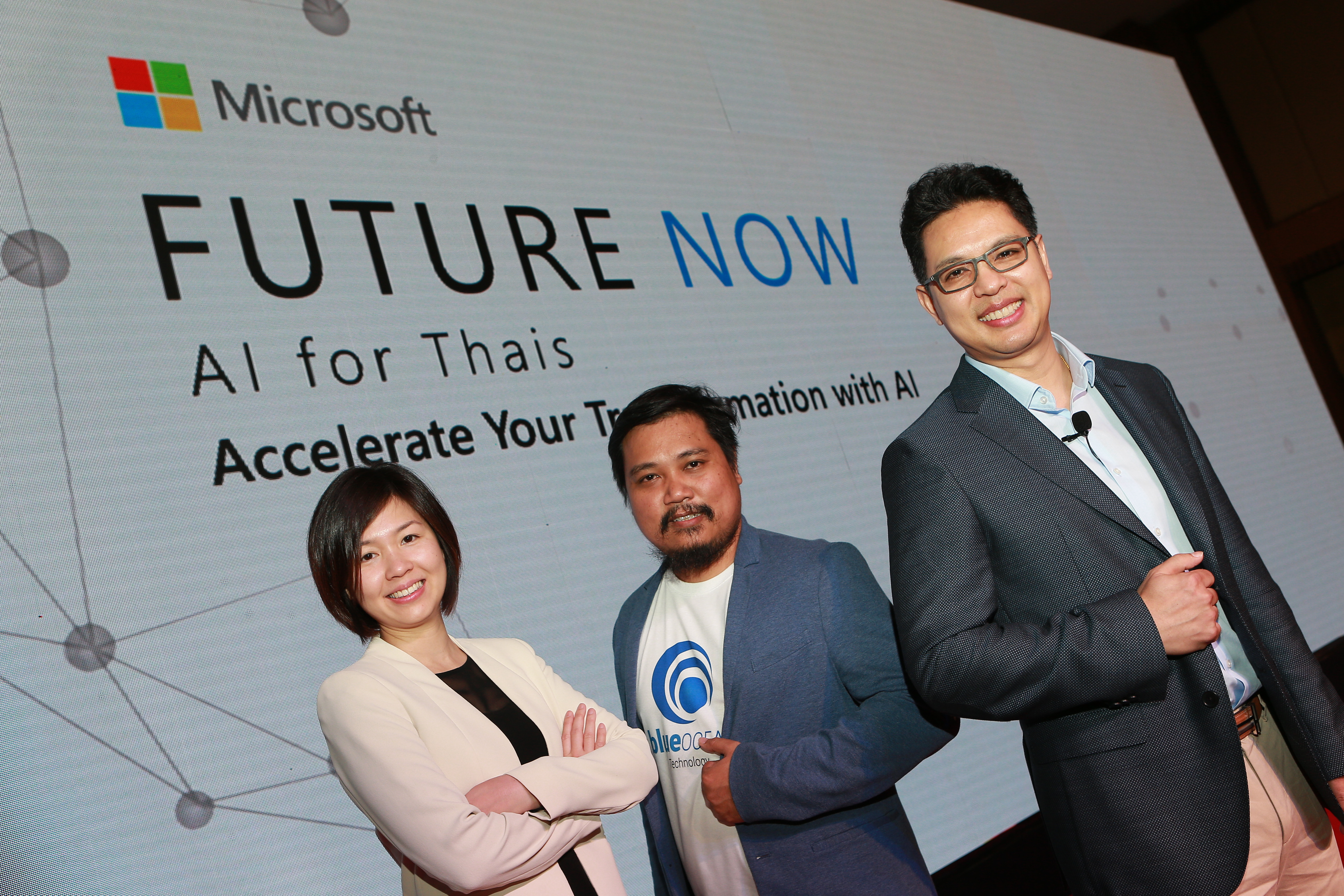From intelligent training solutions to unprecedented advances in medical research, Microsoft AI is poised to take human capability to new heights as Thailand advances towards a digital future
Bangkok, 28 November 2018 – Microsoft Thailand provided a glimpse into Thailand’s digital future and the implications of artificial intelligence on our society as part of its inaugural “Future Now” conference, held under the theme “AI for Thais.” To underline the industry-leading capabilities of the Microsoft AI platform, the company showcased solutions and customer success stories that represent milestones in present-day, real-world AI implementations along with forward-looking perspectives and recommendations from senior executives and a Thai multidisciplinary researcher from Microsoft Research Cambridge.
Dhanawat Suthumpun, Managing Director of Microsoft (Thailand) Limited, said, “Our joint research with IDC shows that AI and IoT are the top technologies shaping the future of businesses in Thailand and across Asia-Pacific, ultimately imbuing greater intelligence into our lives and our work. To seamlessly and effectively integrate AI into Thai lives and Thai society, we must consider four key factors: the development of digital skills for all Thais; localization of technology to match linguistic, cultural, or even legal and policy circumstances; development of partners and developers to take advantage of the technology; and a commitment to create tailor-made products and services that drive Thai customers to success.”
The Future of AI – A picture of potential and balance
 Combining high-level expertise in the fields of medicine and computer science, Dr. Pijika Watcharapichat is part of the Microsoft Research team in Cambridge, England, bringing a Thai perspective to an international team of thinkers from all over the world.
Combining high-level expertise in the fields of medicine and computer science, Dr. Pijika Watcharapichat is part of the Microsoft Research team in Cambridge, England, bringing a Thai perspective to an international team of thinkers from all over the world.
“Artificial intelligence and machine learning technologies have the potential to transform how various illnesses are dealt with,” said Dr. Pijika. “Advances in medical imaging as well as deeper, more sophisticated analytics for health records are just some of the most exciting areas of development today as we move towards a world of preventive medicine – where medical conditions are foreseen and prevented instead of remedied. Furthermore, the sheer capacity of AI to process vast amounts of data intelligently will enable greater precision in personalized treatment, assist medical personnel in operating with greater efficiency and confidence, and pave the way to new discoveries, such as a thorough understanding the incredibly complex human genome.”
While AI offers massive untapped potential with capabilities that far exceed those of humans in some aspects, Dr. Pijika does not see it as a threat to human job prospects. “AI will not be replacing experts in their fields of expertise. Instead, technology will bolster their ability to glean useful insights from data, making more informed decisions, and speeding up new discoveries to an unprecedented extent.”
Dr. Pijika’s sentiments are echoed by Sunny Park, Regional Director – Corporate, External and Legal Affairs, Microsoft Asia Pacific: “The Microsoft-IDC study shows that 95% of jobs in Thailand will be transformed over the next three years. While 30% of jobs will be outsourced, automated, or simply made obsolete, a roughly equal number of new roles created by shifts in the digital landscape will emerge to provide ample opportunities in the workforce. A further 35% of the workforce can be retained. These numbers do indicate to us that it is not about job displacement but job transformation and upskilling. Already, we are working to help people get the new skills they need, with efforts ranging from programs for youths in Thailand such as the Coding Thailand initiative with DEPA to programs for the workforce. For example, we recently made a public pledge, along with other major tech companies, to develop digital skills for the ASEAN workforce as part of the World Economic Forum’s Digital ASEAN initiative, which aims to train some 20 million people by 2020.”
Ms. Park also stressed the need for ethical principles and regulatory oversight in AI development. “As AI systems get more sophisticated and start to play a larger role in people’s lives, it’s imperative for policymakers, academics, NGOs and the private sector to come together to develop and adopt clear principles and regulatory guidance that guide the people building, using and applying AI systems. These principles should ensure that AI systems are fair, reliable and safe, private and secure, inclusive, transparent and accountable. In short, we need to ensure a responsible AI. To help achieve this, foundational legislations on privacy and cybersecurity must be put in place, and we applaud the policymakers in Thailand for working with the private sector on the draft legislations in these two critical areas.”
The Present of AI – Doing more, digitally
 As part of “Future Now”, Microsoft showcased an award-winning application from Thai tech startup Blue Ocean Technology – led by Chief Executive Officer and founder Pirmpong Iewbandansook. Utilizing virtual reality and machine learning technologies, Blue Ocean’s VRSIM is a virtual training system for operators of agricultural machinery – more specifically sugarcane harvesters – that not only overcomes the limitations of traditional training methods but also boosts the efficiency of crop harvesting through machine learning.
As part of “Future Now”, Microsoft showcased an award-winning application from Thai tech startup Blue Ocean Technology – led by Chief Executive Officer and founder Pirmpong Iewbandansook. Utilizing virtual reality and machine learning technologies, Blue Ocean’s VRSIM is a virtual training system for operators of agricultural machinery – more specifically sugarcane harvesters – that not only overcomes the limitations of traditional training methods but also boosts the efficiency of crop harvesting through machine learning.
“The typical training process for a sugarcane harvester driver is not only time consuming but also involves real risk of damaged or lost crop. In fact, it could take as long as three years for a new driver to proceed from observation and practice to full harvester operation,” said Pirmpong. “VRSIM uses virtual reality technology to give drivers-in-training the opportunity to learn and practice without any of the constraints in terms of seasonal timing or crop damage. With machine learning capabilities, we are utilizing the expertise of veteran harvester drivers to analyse field conditions and recommend the best driving route or pattern for optimal harvesting efficiency.”
The application has already been recognized as a breakthrough, winning the Thailand ICT Award (TICTA) 2018 in the Industrial (Agriculture) category along with a finalist spot in the Digital Content category for the ASEAN ICT Awards (AICTA) 2018.
From now to the future – Microsoft’s AI journey
In addition to fostering and enabling innovations from creators, entrepreneurs and partners across Thailand and the world, Microsoft’s AI platform also plays host to cutting-edge technologies that cover everything from infrastructure and development tools to software and hardware implementations with real-world uses.
Microsoft Research – or MSR – continues to blaze a trail in exploring new technological frontiers across a wide range of applications. The Asia branch, MSRA, recently celebrated its 20th anniversary after having published more than 5,000 research papers to further cement Microsoft’s status as one of the world’s leading innovators.
“We are proud to see our cloud and AI platforms empower entire technological ecosystems in Thailand and beyond to drive every stakeholder to achieve success together. For us, the success of Microsoft and our partners can only be measured by the success of our customers,” said Dhanawat.

